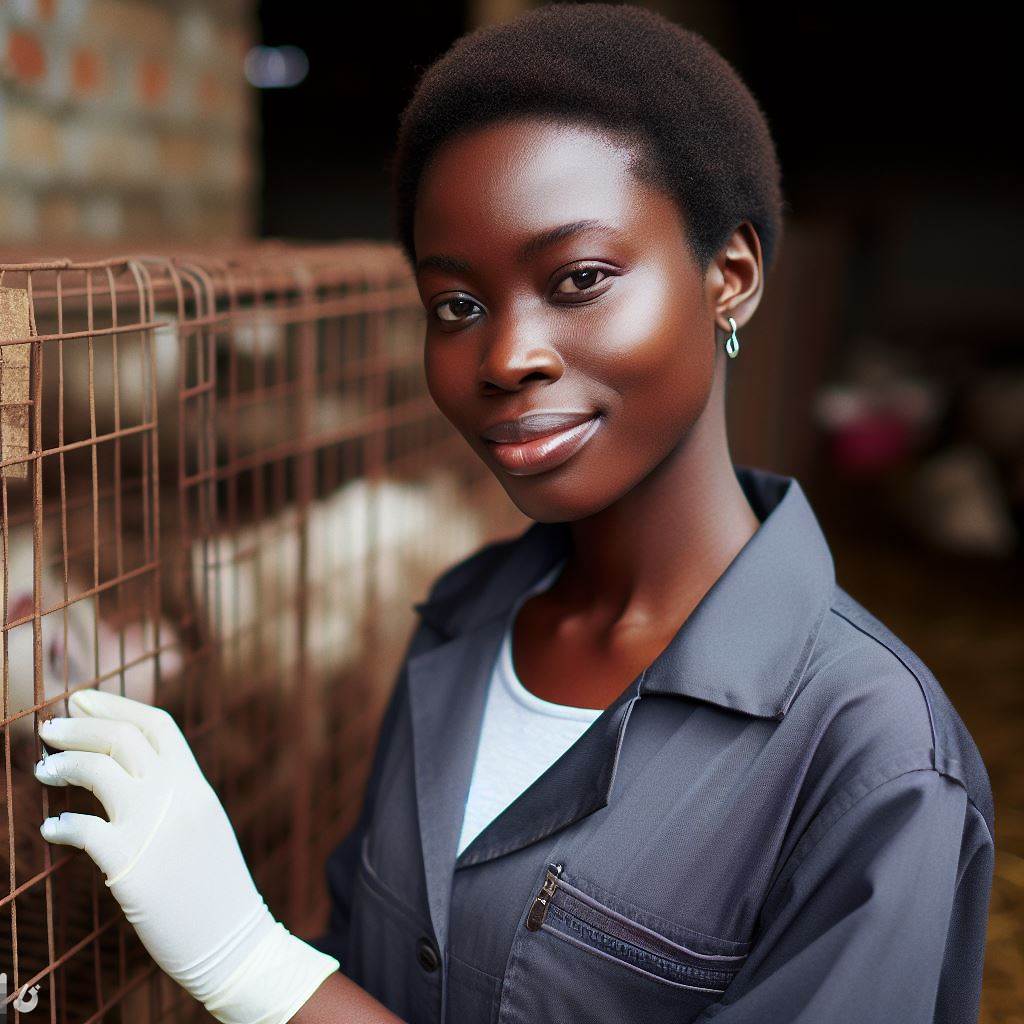Introduction
In this blog post, we will explore Animal Breeding and Genetics Course Outline.
Animal Breeding & Genetics is a branch of science that focuses on improving animal populations through selective mating and genetic manipulation.
Studying Animal Breeding & Genetics is significant as it leads to improvements in animal production and health.
In Nigerian universities, the course outline covers a wide range of topics.
Definition of Animal Breeding & Genetics
Animal Breeding & Genetics involves the manipulation of genetic traits in animals through selective breeding to enhance desirable characteristics and improve overall performance.
Significance of studying Animal Breeding & Genetics
This field’s study aids breeders in enhancing animal traits like growth rate, disease resistance, and better milk/meat production.
It also contributes to the overall sustainability and profitability of the animal agriculture industry.
Overview of the course outline in Nigerian universities
Nigerian university courses cover Mendelian genetics, population genetics, quantitative genetics, and breeding methods in Animal Breeding & Genetics.
Students will learn about inheritance patterns, genetic variation, selection methods, and the application of biotechnological tools in animal breeding.
The curriculum also covers topics like reproductive technologies, genetic improvement programs, and genetic diversity conservation.
In essence, Animal Breeding & Genetics is a significant field of study in Nigerian universities.
It focuses on improving animal populations through selective breeding and genetic manipulation, leading to better animal production and health.
The course outline covers various topics that provide students with a comprehensive understanding of genetics and breeding methods.
Read: The Role of Technology in Modern Animal Nutrition Education in Nigeria
Core Concepts in Animal Breeding & Genetics
Animal breeding and genetics are important topics in the field of animal science.
These subjects focus on understanding the principles of genetics and how they can be applied to improve animal breeds.
In Nigerian universities, courses on animal breeding and genetics are taught to students studying animal science or related fields.
Introduction to Genetics
The course generally begins with an introduction to genetics.
Students learn about the basic concepts of genetics, including genes, chromosomes, and DNA.
They also learn about Mendelian inheritance, which explains how traits are passed down from parents to offspring.
This section emphasizes differentiating genetic makeup from observable animal characteristics, aiding students in understanding genotype and phenotype.
Animal Breeding Principles
Animal breeding principles are the next topic covered in the course.
Students learn about heritability and selection, which are crucial in developing superior animal breeds.
Traits can pass to the next generation based on heritability. Choosing animals with favorable traits defines selection in breeding.
Breeding value and genetic improvement are also discussed, as they involve using genetic information to select the best animals for breeding programs.
Genetic diversity and conservation are additional concepts covered, emphasizing the importance of maintaining diverse and healthy animal populations.
Gene Mapping and Genomics
The final section of the course focuses on gene mapping and genomics.
Students are introduced to different gene mapping techniques used to identify the location of specific genes on chromosomes.
This knowledge is then applied in the context of animal breeding, where genomics can be used to predict an animal’s genetic potential and make more informed breeding decisions.
Molecular markers, such as DNA sequences, are also discussed as tools for identifying and tracking desirable genetic traits in animals.
Throughout the course, students are provided with both theoretical knowledge and practical examples.
They may have the opportunity to work with real-life animal breeding and genetic data, using statistical tools and software to analyze and interpret genetic information.
The course aims to equip students with a thorough understanding of animal breeding and genetics, preparing them for careers in animal breeding, genetics research, or related fields.
In fact, the course outline for animal breeding and genetics in Nigerian universities covers core concepts in genetics, animal breeding principles, and gene mapping techniques.
By studying these topics, students gain a deep understanding of how genetics can be applied to improve animal breeds and contribute to the field of animal science.
Read: Career Opportunities after Studying Animal Genetics in Nigeria
Applied Animal Breeding & Genetics
Animal breeding and genetics play a crucial role in improving the overall quality and productivity of livestock in Nigerian universities.
This section focuses on the applied aspects of animal breeding and genetics, including breeding for performance traits, genetic engineering, and reproductive technologies.
Breeding for Performance Traits
Breeding for performance traits is an essential practice in animal breeding.
It involves selecting animals with superior performance characteristics, such as increased milk yield, faster growth rate, or disease resistance.
Transform Your Career with Expert Guidance
Get personalized mentorship consulting that’s tailored to your unique path. Our expert advice is actionable and exclusive.
Get StartedBy selectively breeding animals with these desirable traits, the overall productivity and profitability of livestock can be improved significantly.
Genetic evaluation and prediction techniques are used to assess the genetic potential of animals for specific traits.
This allows breeders to make informed decisions about which animals to breed and which traits to focus on.
By using advanced genetic evaluation tools, breeders can further enhance the genetic progress of their livestock populations.
Genetic Engineering in Animal Breeding
Breeding for disease resistance is another critical aspect of animal breeding.
By selectively breeding animals that are naturally more resistant to common diseases, breeders can reduce the risk of disease outbreaks and improve animal welfare.
This not only improves the overall health and well-being of the livestock but also reduces the need for excessive use of antibiotics and other medications.
Genetic engineering techniques have revolutionized animal breeding practices.
With the introduction of genetic engineering, it is now possible to introduce specific genes or traits into livestock populations.
This has led to the development of genetically modified animals with improved traits, such as increased milk production or disease resistance.
Ethical concerns and regulations surrounding the use of genetic engineering in animal breeding are also important considerations.
Reproductive Technologies
Reproductive technologies, such as artificial insemination, embryo transfer, cloning, and transgenics, have also played a significant role in improving animal breeding and genetics.
These technologies allow breeders to overcome reproductive limitations and enhance the efficiency of breeding programs.
Artificial insemination enables the use of superior sires, ensuring the dissemination of desirable traits throughout the population.
Embryo transfer facilitates the production of multiple offspring from genetically valuable females.
Cloning and transgenics have the potential to create exact genetic replicas and introduce novel traits, respectively.
In short, the applied aspects of animal breeding and genetics in Nigerian universities encompass breeding for performance traits, genetic engineering, and reproductive technologies.
These practices aim to enhance the productivity, adaptability, and disease resistance of livestock populations.
As technology continues to advance, it is crucial to consider the ethical implications and adhere to existing regulations to ensure responsible and sustainable animal breeding practices.
Read: Top 5 Universities in Nigeria Offering Animal Physiology

Practical Applications in Animal Breeding & Genetics
Animal Breeding & Genetics courses in Nigerian universities not only focus on theoretical knowledge but also emphasize practical applications.
Students are provided with hands-on experience in breeding programs to enhance their understanding and skills in animal breeding techniques.
Hands-on Experience in Breeding Programs
Field trips to breeding farms are an integral part of the curriculum.
These visits enable students to observe and learn from experienced breeders, interact with different livestock species, and understand the practical challenges involved in breeding programs.
By witnessing the day-to-day operations and management practices, students gain valuable insights into the application of genetics in animal production.
Practical exercises on data analysis are conducted to familiarize students with statistical tools commonly used in breeding programs.
Students learn to collect and analyze data related to animal performance, selection criteria, and genetic parameters.
Through these exercises, they understand how to interpret and make informed decisions based on the statistical results, contributing to effective breeding strategies.
Workshops on breeding techniques are organized to provide students with comprehensive knowledge of the latest advancements in the field.
Experts in the industry share their experiences and guide students on various breeding methods, including artificial insemination, embryo transfer, and selection strategies.
These workshops enhance the students’ practical skills, enabling them to implement innovative breeding techniques in their future careers.
Research in Animal Breeding & Genetics
Research plays a crucial role in animal breeding and genetics, and students are encouraged to actively engage in research projects.
Designing and conducting breeding experiments allow students to apply their theoretical knowledge to practical scenarios.
Under the guidance of faculty members, students design experiments to address specific breeding objectives, such as improving growth rate or disease resistance.
These experiments enable students to understand the complexity of breeding programs and the importance of controlled studies.
Analysis of research data is a critical step in animal breeding.
Students learn various statistical techniques to analyze data obtained from their experiments.
By analyzing phenotypic and genetic data, students can estimate heritability, genetic correlations, and breeding values.
This analysis provides valuable insights into the genetic architecture of traits and helps in making informed breeding decisions.
Presenting findings and recommendations is an essential skill in the scientific community.
Encouraging students to share findings actively through posters, oral presentations, and scientific papers is paramount.
This process helps students develop effective communication skills and fosters collaboration and knowledge sharing among peers and experts in the field.
It also allows students to contribute to the existing body of knowledge in animal breeding and genetics.
In general, Nigerian universities offer practical components in Animal Breeding & Genetics courses to provide students with hands-on experience and research opportunities.
Field trips, practical exercises, and workshops enhance students’ skills and understanding of breeding techniques.
Research projects enable students to apply theoretical knowledge and contribute new findings to the field.
Students actively apply these concepts, equipping themselves to tackle real-world challenges in animal breeding and genetics effectively.
Read: Top Nigerian Universities Offering Animal Breeding & Genetics
Conclusion
The importance of Animal Breeding & Genetics in Nigerian agriculture cannot be underestimated.
It plays a crucial role in improving animal productivity, quality, and disease resistance.
The future prospects and career opportunities in this field are promising, with increasing demand for professionals in genetics research, animal breeding, and related industries.
This course provides a solid foundation for those considering a career in Animal Breeding & Genetics, offering opportunities to work in various sectors of agriculture, research, and academia.
By studying Animal Breeding & Genetics, students can contribute to the sustainable development of Nigeria’s agriculture sector and help address food security challenges in the country.
Students passionate about agriculture and genetics should pursue Animal Breeding & Genetics due to its potential.
With the right education and skills, graduates can make a significant impact in improving livestock production, genetics research, and overall agricultural development in Nigeria.
So, let us embrace the opportunities offered by Animal Breeding & Genetics and contribute to the growth of Nigerian agriculture!




